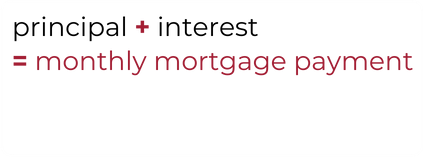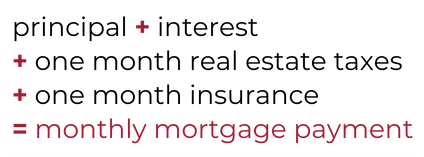Like a tour guide that leads you through a museum, a mortgage lender is your guide to purchasing a home. They will make sure you understand every aspect of the homebuying process, from the program types and documentation to the terminology and abbreviations.
But the homebuying process isn’t free of confusing jargon. Even with a guide it can be helpful to have a base of knowledge before jumping into a major financial move. We’ve put together a glossary of mortgage terms that are good to know as you step into purchasing a home.
Ease into homebuying by being prepared for the conversations you will have with your lender.
Mortgage Terminology Glossary
Adjustable-Rate Mortgage:
An Adjustable-Rate Mortgage (ARM) is a type of loan with an interest rate that varies depending on how the market rates move. The ARM loan option gives you a short introductory period with a fixed rate. After the term ends the rate will adjust with the market.
Amortization Period:
An amortization period is the amount of time it should take a homeowner to pay off their mortgage in full, based on their current interest rate and payment schedule. Together with the loan term an amortization period helps define your overall costs, interest rates and monthly payments, and will affect your mortgage flexibility and borrowing costs.
Annual Percentage Rate:
An Annual Percentage Rate (commonly known as an APR) reflects the true cost of the funds you have applied for and is reflected as a yearly percentage. The APR typically includes interest rates, points, and fees charged. The terms vary by loan type and lender. The amount you pay will depend on whether your loan is fixed or variable, meaning the rate may stay the same or it might change with market factors. Fixed and variable APRs could still change based on other factors, but lenders typically have to notify borrowers upfront or before a change occurs.
Appraisal:
An appraisal is used in real estate. Complete by a licensed professional, it compares the subject property to like properties to determine the property's value. The sale price of a property is how much the buyer offers the seller for the property. When purchasing property, the appraisal amount vs the sale price is used to determine how much the bank will lend to the borrower.
If the sale price and the appraisal amount are aligned, the loan could cover the sale. A down payment would still be required on the loan. If the sale price is higher than the appraised value, the buyer is responsible for the portion of the sale not covered by the loan and for the down payment.
Bridge Loan:
A bridge loan is a type of temporary mortgage financing that may allow you to purchase a new home before selling your current home. A bridge loan can be helpful in the current competitive purchase market. A lender can offer you more details on this financing option.
Closing Disclosure:
A closing disclosure (CD) is a document you will receive during the closing step of the home loan process. The CD itemizes the associated costs of the loan, setting the final terms for closing costs. A closing disclosure is required to be provided to you at least 3 days before closing and sets the final terms for closing costs. Third party and bank costs associated with the loan will appear on the loan estimate.
Debt-to-Income Ratio:
A Debt-to-Income Ratio (DTI) calculates a percentage that represents how much debt you have compared to your income. When applying for a mortgage your lender will evaluate your DTI to determine whether you are financially secure enough to add a mortgage to your monthly debt payments. Car loan, student loan, and personal loan payments are examples of monthly debt payments that would total to determine your DTI. Each loan program has DTI limits that can affect qualification.
Earnest Money:
Earnest Money is a “good faith deposit” added to an offer on a property. Given at the time of the offer to make the buyer “stand out”, earnest money can get a buyer ahead in a competitive market. Funds usually range between 1%-3% but can be any amount. They are typically deposited into an escrow account when the offer is accepted. Contingencies will be added to the purchase agreement, laying out terms for where the earnest money goes should the sale fall through. The funds are accessible at closing. The earnest money can then be applied to the buyers down payment, closing costs or can be taken as cash.
Escrow:
An escrow is an account set up by your lending institution to pay specific mortgage items when they come due. These items include real estate taxes, homeowners insurance, and private mortgage insurance.
The benefit of escrow to the borrower is the ability to collect the sum of each item over time and across multiple payments. The annual cost of the items is dispersed across the monthly mortgage payment and placed into the escrow. Then, the lump sum of the item is then pulled from the escrow and paid at the time it is due. Some financing situations require the borrower to escrow. This ensures payment of the required items. Other borrowers can choose to waive escrow.
Final Closing Disclosure:
The Final Closing Disclosure (FCD) contains the final cost, fees, and credits for the loan and is signed at the closing table. Actual fees and costs (like title work, tax prorations, and so on) will be on the Final Closing Disclosure and signed at the time of closing.
Homeowners Insurance*:
Homeowners Insurance (HOI) is a type of protection that compensates you if your home gets damaged from a covered incident. You are required to have home insurance coverage at the time of closing on the loan. HOI can be billed separate from, or rolled into, your monthly loan payments.
Mortgage Insurance:
Mortgage Insurance (MI) provides the lending institution insurance against loss on a mortgage in the event of a borrower default. MI is required with conventional loans that receive less than 20% down and it billed through your monthly mortgage payments. There are multiple options for Mortgage Insurance.
Initial Closing Disclosure:
The Initial Closing Disclosure (ICD) is the most time-sensitive document in the closing process. It ensures you and your lender are on the same page about what final totals will be at closing. An ICD is federally mandated to be received by the borrower three days before closing. A delay in acknowledging the receipt of the Initial Closing Disclosure will result in a delayed closing on the mortgage.
Loan Estimate:
A loan estimate (LE) is a document you will receive during the application step of the home loan process in the initial disclosure packet. The LE itemizes the associated costs of the loan, providing an estimate of final terms for closing costs. Third party and bank costs associated with the loan will appear on the loan estimate.
Loan Term:
A loan term is the length of time a mortgage contract is in effect and represents how long the homeowner has until they repay the principal balance. Together with the amortization period, the loan term will affect your borrowing costs. Short and long term financial decisions should be kept in mind while deciding on the term and schedule.Contact a BOS lender to get help on finding the right balance for your loan.
Loan to Value:
Loan to Value (LTV) is a financial term used by lending professionals to express the ratio of loan balance to the value of the asset. The LTV can be used to determine if the lender will approve of the loan and if the loan requires private mortgage insurance (PMI).
Payment Calculations:
A mortgage payment can be itemized into these items: Principal, Interest, Real Estate Taxes, Insurance (home and/or private mortgage). These figures are used to determine total amount of a monthly mortgage payment and are commonly calculated using a P&I or PITI breakdown.
P&I Payments include the principal and interest amounts.
.png)
PITI Payments include the principal and interest amounts plus dispersed escrow (tax and insurance) costs.
.png)
Rate Lock:
A rate lock is a guarantee by the lender to hold your interest rate in place for a certain amount of time. If you do not close on your loan in the specified timeframe, you will need to extend the lock or let it expire. In some cases, there may be a fee for either option.
Title Work:
Title work is completed by a title company and ensures that the property you are purchasing is free of liens and encumbrances. Typically stepping in during the closing process, the title company will review things like covenants, bylaws, and regulations associated with the property. They will look into the full history of ownership of the property, or "chain of title". The title company will provide the borrower with all information discovered and can stop the sale if deemed necessary to protect the borrower or the financial institution. Each state has different standards for title work, like what steps are required and who pays for it to be completed.
We know that these terms can be a lot to take in and now you may even have more questions than answers. That’s okay! Our mortgage lenders are always available to help. We want to make sure you understand the whole process, every step of the way.
We want to make sure you are an informed homebuyer.
* Insurance products are not insured by the Federal Deposit Insurance Corporation (FDIC) or any government agency. Insurance products are not deposits, obligations, or guaranteed by the bank or its affiliates. Insurance products may lose value. Insurance products are not a condition to any bank loan, product or service.